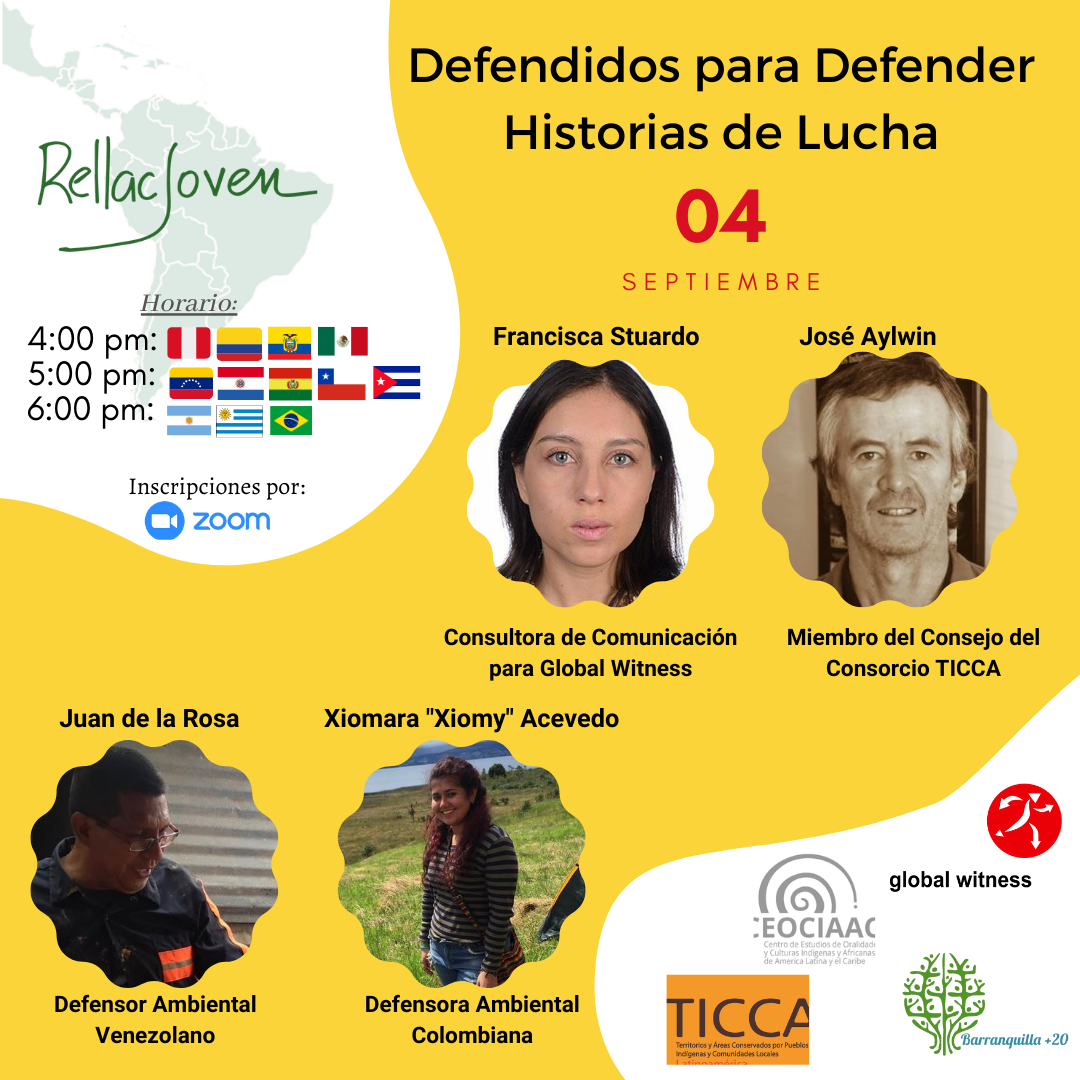First published on 09/29/2020, and last updated on 02/11/2025
Perspectives from the webinar on defending nature defenders. RELLAC-Joven organised the webinar together with the ICCA Consortium, Global Witness and activists from Colombia and Venezuela.
By Vilisa I. Morón Zambrano (RELLAC-Joven and Honorary Member of the ICCA Consortium), Oscar FM Albornoz Vegas (RELLAC-Joven) and Lizbeth Granados Roldán (RELLAC-Joven)
The people who defend nature also need to be defended. But how well do young people know about the kind of challenges our environmental defenders encounter, how they deal with those challenges, and what new challenges are coming up in the future?
To discuss these issues, the youth-based nature conservation group RELLAC- Joven has organised a webinar on 4 September, 2020 together with the ICCA Consortium, Global Witness, and activists from two of the most dangerous countries for defenders; Colombia and Venezuela.
RELLAC-Joven is a network of young leaders in protected and conserved areas of the Americas. The youth initiative has individual and organisational members in nine countries who are working to influence public policy to protect the territories of life.
This webinar was organised out of concern based on the findings of the report Defending Tomorrow: The climate crisis and threats against defenders of the land and the environment.
The report by Global Witness shows that seven of the ten most dangerous countries for environmental defenders are in Latin America, accounting for 145 of the 212 murders recorded worldwide. Also, when analysing the events and documents according to the population by country, Honduras, Colombia, Nicaragua, and Guatemala lead the top 5 along with the Philippines. Sadly, Latin America is the most dangerous region since 2012, when Global Witness started documenting killings and violence against environmental defenders.
Based on the presentations of the speakers, we have identified three main conclusions:
- The resistance against destructive activities in the territories of life must be supported. This support can be in the form of documentation, information, and dissemination. The acts of violence against the defenders, the protests, initiatives, and actions organised by communities must be documented. We have to look for documented information to know the situation on the ground and to support the resistance in our areas. We need to share, disseminate, and comment on verified information about what is happening in the territories of life to support the actions and initiatives.
- There are diverse and numerous groups, collectives and organised communities in the Americas, which have faced and continue to face struggles in territory and urban areas such as: coal mining, gold mining, eviction from the territory, climate risk, among others.
- The ICCA Consortium has gathered valuable information on different Indigenous communities in the Americas, their challenges, achievements and threats. In addition, they are constantly monitoring and strengthening organised indigenous groups, including those in the Andean Amazon and Central America, considered the most dangerous regions for defenders in the Americas. Likewise, they are in constant search and recognition of the initiatives of protection and conservation of the territory by the ancestral communities.
We also invite to think beyond the murder of environmental defenders. Murders are only the tip of the iceberg of all threats to environmental defenders, as some abuses range from verbal threats to discriminatory acts against women.
These are documented cases, but what about those that have been forgotten, silenced, or are unknown because of their remoteness and have not come to light? In how many places have we walked, lived together, and on their ground bear the mark of a fallen defender?
SPEAKERS
- Francisca Stuardo, Communications Consultant for Global Witness
- José Aylwin, Observatorio Ciudadano (ICCA Consortium Member) and Council Member of ICCA Consortium
- Juan Carlos La Rosa, environmental defender from Venezuela
- Xiomara ¨Xiomy¨ Acevedo, environmental defender from Colombia
Protection for the protectors is a must. If we don’t take care of the environmental defenders who will continue to take the lead in protecting nature? If we do defend the defenders, we will be also in fact taking care of our lives.
These virtual meetings were successful because of the participation of different organisations, which represent the best tool to make visible the environmental and social problems that we go through in Latin America and the Caribbean concerning protected areas.
Exposing the problem is only the first step in advancing legal matters for the total defence of our spaces and all the life they shelter.
Featured image: The poster of the webinar
Translated from Spanish
